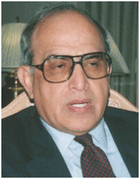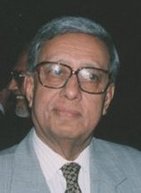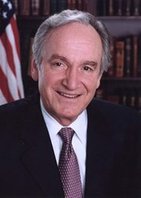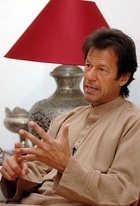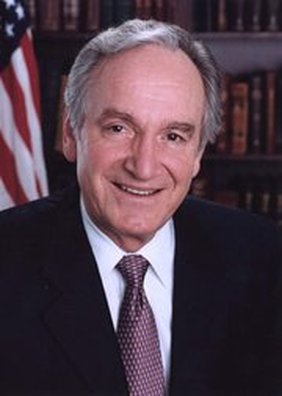
Interview: Thomas R. Harkin
"Helping America Better Appreciate Pakistan"
By: Tashbih Sayyed
If there is one thing, positive, that can be attributed to the spate of nuclear explosions in South Asia, it is the re-emergence of the Kashmir dispute on the international scene and the realization by the world powers that Pakistan, as a nuclear power, is more than competent and deserving to represent the Islamic world, in the UN, as a permanent member of its Security Council. Pakistan has obviously shown that, it has the military power to defend itself and bargain on an equal level with its neighbors, declared Senator Thomas R. Harkin. He was replying to an exclusive question put to him by Pakistan Today, (partly reported in the local newspaper without giving credit to Pakistan Today) during a fund raiser in his honor by Attiazaz and Naureen Din and Ahmed and Parveen Ali at latter’s residence.
Senator Harkin is one of those very few US legislators who have not only equipped themselves with the knowledge and information about Pakistan, a country that is, because of its strategic station, going to be the focus of attention of the world powers for a long time to come, but uses his influence to defend it, wherever and whenever a need arises. Talking to Pakistan Today, he dwelt on the possibilities of Pakistan being a member of the UN Security Council, he advocated the case of Pakistan on the basis that Muslim states are emerging as an important group of nations contributing toward peace and stability of the world, and Pakistan being a Muslim state, having established itself as a responsible military power, should be considered for a permanent seat in the UN Security Council, “I would like to raise the level of thinking. Why not think of Pakistan?”
Senator Thomas Harkin, discussed at length, the role, Pakistan can play among the comity of nations. He said that now that the immediate concern, regarding one’s national security interests have been taken care of by matching India’s atomic explosions, Pakistan can move ahead positively and more aggressively than India by working for non-proliferation and other objectives of world peace and stability. He emphasized that if Pakistan acts responsibly, in accordance with its stature, it can take the lead in South Asia, “Pakistan has obviously shown that it has the military power to defend itself and bargain on an equal level with its neighbors. I would hope that it’s role might be one of moving ahead more aggressively than what India has been doing. While they felt, it was in their best national security interests, that phase is over and they are ready to move on to a new level. I think, if they do that, Pakistan can then take the lead in South Asia. It would be looked upon as a leader in the region, in non-proliferation, CTBT etc. It could move Pakistan ahead.
Replying to another exclusive question by Pakistan Today, that, is the US is ready to help and assist Pakistan in fulfilling this role? The Senator replied, that before the US could extend its hand of assistance, sanctions would have to be lifted and for that, it would like Pakistan to do certain things. What the senator meant was that Pakistan would have to sign the CTBT and other treaties that the US feels are essential to control the spread of weapons of mass destruction.
Aware of the fact that the US president has the authority to lift the sanctions, Pakistan Today wanted to know if there was a standard by which the US would judge the conduct of these two new nuclear powers? Will this judgment be based on any norm of justice and fair play or would it be guided by national expediencies only. How far would the US go to use sanctions as a leverage to realize its policy objectives? The Senator’s reply was not surprising. He pointed out that the world powers act in line with their national interests, just like Pakistan when it felt that it was in its best national security interests to respond to the Indian atomic explosions in the same terms. And the US feels that unless Pakistan signs the NPT , CTBT etc, it will not lift the sanctions, “Well, as you know, the President has the power to lift sanctions. I think the administration would like to lift the sanctions, at least partially. But just as Pakistan felt it had to do certain things in its national security interests, the US government cannot now lift sanctions unilaterally without something being done.
We again wanted to be clear as to how the US was going to distinguish between India and Pakistan, when it comes to punishing the violators of US laws? So this scribe asked, I know, under this nuclear cloud, it is difficult for the US to distinguish between two countries like India and Pakistan, but if it has to, then will it be on the basis of justice or expediency? Senator Harkin was very forthcoming, he said that the US has to make sure that the countries of South Asia are not working or acting in a manner that jeopardizes US national interests. The US cannot help any country at the cost of its own national interests. Reflecting on the explosive situation on the LoC in Kashmir, he warned that if, “tensions increase in south Asia, we would be drawn into it. Our military would be drawn into it. We are the only ones that could do it.” This is the first time that someone from the US legislature, for that matter, someone who serves on the Senate Appropriations Subcommittee, has been so open about the extent, to which the US is ready to go in order to prevent the two countries from going to an all out war. He said, “Well, I operate from the premise that countries always act in their national self-interest. They have to. All executives, leaders take an oath saying so. Looking at South Asia, the US will look in terms of their own self-interest first. Then it will see which developments enhance that along with regional stability. It is in the US best interest to have regional stability in South Asia. to promote economic growth, to promote education in South Asia. I say that because as the only superpower left, if trouble happens, if tensions increase in South Asia, we would be drawn into it. Our military would be drawn into it. We are the only one that could do it.” It was clear that the US could not afford to let this region slip into an abyss of instability. Again, the Senator, without mincing any words, let everyone know that Pakistan and India will have to find a way to coincide their interests with US interests. He made it abundantly clear that if the policies and actions of these countries continue to be on a collision course with US policies, then there will be no relaxation in the sanctions. He seemed very clear regarding the Indian hegemonic ambitions when he said, “I see no reason why both sides need to continue nuclear testing. India did theirs in 1974, and today the same things holds true. India wants to be considered a nuclear power. Now Pakistan Today thought it a perfect stage to ask the Senator of his views on India’s ambitions to be a permanent member of the UN Security Council. “Do you see India sitting on the Security council...as a permanent member?
Senator Harkin: No...no. I spoke last week about Pakistan sitting on the Security Council. The Muslim world encompasses about half of the world’s population, yet it has no representation in the council. If India keeps pushing for it, they have to know what is at stake. China will never let India join. I would like to raise the level of thinking. Why not think of Pakistan?
Senator Harkin was sure that if there is any chance for Pakistan, then it is through educating the masses. He said that Pakistan needs a great leap forward in the field of education. Because it is the education that will create honesty in the society and kill the demon of corruption. He was very concerned that over 50 years of its existence, education in Pakistan, instead of advancing, has in fact, retarded to a level that is even backward than it was at the time of independence.
Giving his understanding on the reasons for such a sorry state of education in Pakistan, the Senator said that most people he spoke to told him that the education system is centrally controlled. There is no local control of what is happening in their local schools. Lack of local control causes all kinds of problems. There are ghost schools, people getting paid but no one is going there. He said that in his view more teachers were needed, but Pakistani authorities told him that they have already tried that once. But it didn’t work because it is all politically controlled. Senator Harkin, said that in Pakistan, the people kept on asking him as to how the education system is so good and they kept asking him as to how the US handles lower and primary education. He said that they were surprised to find out that here in the US the federal government does nothing. It is handled at the local level. Local school boards, etc.. People who are most affected control the education system directly. How can they let the education system go down when the their own children’s future depends on it? No discussion about Pakistan is complete without a reference to the rampant corruption in the country. And the Senator had some very positive ideas on the subject too. He said that the banks in Pakistan will have to be in private hands. Private control resists abuse of its charge. Government control is susceptible to corruption and misuse use. He said that Pakistan will have to have people from foreign countries to invest and help make sure that the banks are being run honestly.
Curtsy By: www.paktoday.com
"Helping America Better Appreciate Pakistan"
By: Tashbih Sayyed
If there is one thing, positive, that can be attributed to the spate of nuclear explosions in South Asia, it is the re-emergence of the Kashmir dispute on the international scene and the realization by the world powers that Pakistan, as a nuclear power, is more than competent and deserving to represent the Islamic world, in the UN, as a permanent member of its Security Council. Pakistan has obviously shown that, it has the military power to defend itself and bargain on an equal level with its neighbors, declared Senator Thomas R. Harkin. He was replying to an exclusive question put to him by Pakistan Today, (partly reported in the local newspaper without giving credit to Pakistan Today) during a fund raiser in his honor by Attiazaz and Naureen Din and Ahmed and Parveen Ali at latter’s residence.
Senator Harkin is one of those very few US legislators who have not only equipped themselves with the knowledge and information about Pakistan, a country that is, because of its strategic station, going to be the focus of attention of the world powers for a long time to come, but uses his influence to defend it, wherever and whenever a need arises. Talking to Pakistan Today, he dwelt on the possibilities of Pakistan being a member of the UN Security Council, he advocated the case of Pakistan on the basis that Muslim states are emerging as an important group of nations contributing toward peace and stability of the world, and Pakistan being a Muslim state, having established itself as a responsible military power, should be considered for a permanent seat in the UN Security Council, “I would like to raise the level of thinking. Why not think of Pakistan?”
Senator Thomas Harkin, discussed at length, the role, Pakistan can play among the comity of nations. He said that now that the immediate concern, regarding one’s national security interests have been taken care of by matching India’s atomic explosions, Pakistan can move ahead positively and more aggressively than India by working for non-proliferation and other objectives of world peace and stability. He emphasized that if Pakistan acts responsibly, in accordance with its stature, it can take the lead in South Asia, “Pakistan has obviously shown that it has the military power to defend itself and bargain on an equal level with its neighbors. I would hope that it’s role might be one of moving ahead more aggressively than what India has been doing. While they felt, it was in their best national security interests, that phase is over and they are ready to move on to a new level. I think, if they do that, Pakistan can then take the lead in South Asia. It would be looked upon as a leader in the region, in non-proliferation, CTBT etc. It could move Pakistan ahead.
Replying to another exclusive question by Pakistan Today, that, is the US is ready to help and assist Pakistan in fulfilling this role? The Senator replied, that before the US could extend its hand of assistance, sanctions would have to be lifted and for that, it would like Pakistan to do certain things. What the senator meant was that Pakistan would have to sign the CTBT and other treaties that the US feels are essential to control the spread of weapons of mass destruction.
Aware of the fact that the US president has the authority to lift the sanctions, Pakistan Today wanted to know if there was a standard by which the US would judge the conduct of these two new nuclear powers? Will this judgment be based on any norm of justice and fair play or would it be guided by national expediencies only. How far would the US go to use sanctions as a leverage to realize its policy objectives? The Senator’s reply was not surprising. He pointed out that the world powers act in line with their national interests, just like Pakistan when it felt that it was in its best national security interests to respond to the Indian atomic explosions in the same terms. And the US feels that unless Pakistan signs the NPT , CTBT etc, it will not lift the sanctions, “Well, as you know, the President has the power to lift sanctions. I think the administration would like to lift the sanctions, at least partially. But just as Pakistan felt it had to do certain things in its national security interests, the US government cannot now lift sanctions unilaterally without something being done.
We again wanted to be clear as to how the US was going to distinguish between India and Pakistan, when it comes to punishing the violators of US laws? So this scribe asked, I know, under this nuclear cloud, it is difficult for the US to distinguish between two countries like India and Pakistan, but if it has to, then will it be on the basis of justice or expediency? Senator Harkin was very forthcoming, he said that the US has to make sure that the countries of South Asia are not working or acting in a manner that jeopardizes US national interests. The US cannot help any country at the cost of its own national interests. Reflecting on the explosive situation on the LoC in Kashmir, he warned that if, “tensions increase in south Asia, we would be drawn into it. Our military would be drawn into it. We are the only ones that could do it.” This is the first time that someone from the US legislature, for that matter, someone who serves on the Senate Appropriations Subcommittee, has been so open about the extent, to which the US is ready to go in order to prevent the two countries from going to an all out war. He said, “Well, I operate from the premise that countries always act in their national self-interest. They have to. All executives, leaders take an oath saying so. Looking at South Asia, the US will look in terms of their own self-interest first. Then it will see which developments enhance that along with regional stability. It is in the US best interest to have regional stability in South Asia. to promote economic growth, to promote education in South Asia. I say that because as the only superpower left, if trouble happens, if tensions increase in South Asia, we would be drawn into it. Our military would be drawn into it. We are the only one that could do it.” It was clear that the US could not afford to let this region slip into an abyss of instability. Again, the Senator, without mincing any words, let everyone know that Pakistan and India will have to find a way to coincide their interests with US interests. He made it abundantly clear that if the policies and actions of these countries continue to be on a collision course with US policies, then there will be no relaxation in the sanctions. He seemed very clear regarding the Indian hegemonic ambitions when he said, “I see no reason why both sides need to continue nuclear testing. India did theirs in 1974, and today the same things holds true. India wants to be considered a nuclear power. Now Pakistan Today thought it a perfect stage to ask the Senator of his views on India’s ambitions to be a permanent member of the UN Security Council. “Do you see India sitting on the Security council...as a permanent member?
Senator Harkin: No...no. I spoke last week about Pakistan sitting on the Security Council. The Muslim world encompasses about half of the world’s population, yet it has no representation in the council. If India keeps pushing for it, they have to know what is at stake. China will never let India join. I would like to raise the level of thinking. Why not think of Pakistan?
Senator Harkin was sure that if there is any chance for Pakistan, then it is through educating the masses. He said that Pakistan needs a great leap forward in the field of education. Because it is the education that will create honesty in the society and kill the demon of corruption. He was very concerned that over 50 years of its existence, education in Pakistan, instead of advancing, has in fact, retarded to a level that is even backward than it was at the time of independence.
Giving his understanding on the reasons for such a sorry state of education in Pakistan, the Senator said that most people he spoke to told him that the education system is centrally controlled. There is no local control of what is happening in their local schools. Lack of local control causes all kinds of problems. There are ghost schools, people getting paid but no one is going there. He said that in his view more teachers were needed, but Pakistani authorities told him that they have already tried that once. But it didn’t work because it is all politically controlled. Senator Harkin, said that in Pakistan, the people kept on asking him as to how the education system is so good and they kept asking him as to how the US handles lower and primary education. He said that they were surprised to find out that here in the US the federal government does nothing. It is handled at the local level. Local school boards, etc.. People who are most affected control the education system directly. How can they let the education system go down when the their own children’s future depends on it? No discussion about Pakistan is complete without a reference to the rampant corruption in the country. And the Senator had some very positive ideas on the subject too. He said that the banks in Pakistan will have to be in private hands. Private control resists abuse of its charge. Government control is susceptible to corruption and misuse use. He said that Pakistan will have to have people from foreign countries to invest and help make sure that the banks are being run honestly.
Curtsy By: www.paktoday.com

 RSS Feed
RSS Feed